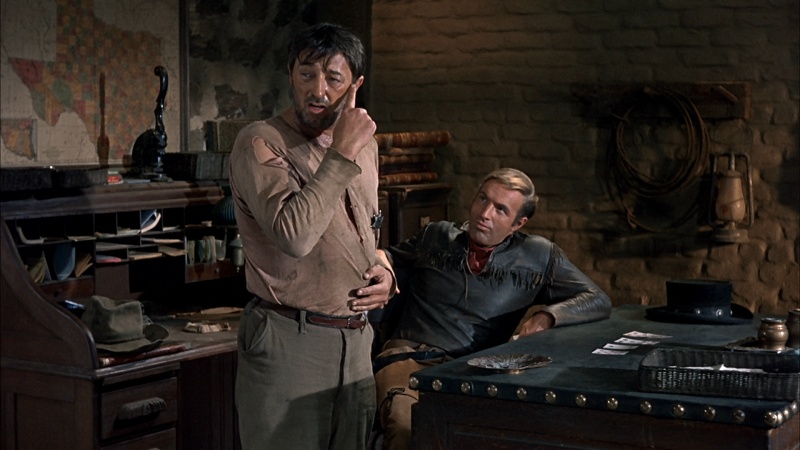| Reviews & Columns |
|
Reviews DVD TV on DVD Blu-ray 4K UHD International DVDs In Theaters Reviews by Studio Video Games Features Collector Series DVDs Easter Egg Database Interviews DVD Talk Radio Feature Articles Columns Anime Talk DVD Savant Horror DVDs The M.O.D. Squad Art House HD Talk Silent DVD
|
DVD Talk Forum |
|
|
| Resources |
|
DVD Price Search Customer Service #'s RCE Info Links |
|
Columns
|
|
|
El Dorado
Paramount // Unrated // March 11, 2014
List Price: $19.98 [Buy now and save at Amazon]
As El Dorado opens, hired gun Cole Thornton (John Wayne) finds himself caught in the crossfire of a range war. He's been put on the payroll of a ruthless rancher (Edward Asner) whose burgeoning empire is starting to buckle under the lack of water. The McDonalds long ago tied up the water rights, and Bart Jason doesn't have the time or inclination to play nice with the family. Thornton is more than handy enough with a six-shooter to take care of any problem that comes his
way, but he knows when to risk his neck and when to ease back. After uncovering all he needs to know about Jason's underhanded schemes and how it could put his old buddy Sheriff Harrah (Robert Mitchum) on the wrong side of his revolver, Thornton chucks what's left of his advance back in his boss' face. As Thorton rides off, though, he startles awake one of McDonald's boys. The overzealous kid fires a shot from his perch, and Thornton reflexively shoots back. The boy misses. Thornton doesn't. It's an honest, tragic accident, but the kid's vengeful sister (Michele Carey) can't let a death like this go unanswered. She gets in a shot of her own. It's not fatal, no, but the bullet's embedded itself deep inside Thornton. Even months after the fact, Thornton finds his body uncontrollably seizing up at the worst possible times.
A funny thing happens once all that setup is out of the way. El Dorado from that point on settles into what might as well be a remake of one of screenwriter Leigh Brackett and director Howard Hawks' most colossally successful films, Rio Bravo. The lawman played by Robert Mitchum that we met early on...? He's the town drunk these days, the same as the former deputy that Dean Martin had played less than a decade earlier. Where Rio Bravo had a young upstart named Colorado fighting alongside the Duke, it's Mississippi (James Caan) this time around. Different state, different weapon of choice. Mississippi is lethal with a blade but couldn't hit the broad side of a barn with a revolver. John Wayne, naturally, plays John Wayne. Charlene Holt steps into Angie Dickinson'sshoeslingerie, Arthur Hunnicutt takes the reins as the movie's resident grizzled old-timer, and sure enough, there's even another siege on the town jail. Harrah sobers up in time to put Jason behind bars, but the rancher's latest hired gun (Christopher George) will go to any length necessary to spring his boss, and he's gotten his mitts on just the right person to trade...
Rio Bravo is as perfect a movie as they come. El Dorado -- the first of Hawks, Brackett, and Wayne's attempts to rekindle that spark -- isn't. That's not to say that this more-or-less remake isn't a hell of a good time in its own right. As brilliant as Rio Bravo's opening sequence is, showing the depths to which this drunken former deputy has fallen without a word of dialogue, El Dorado resonates in a different way. When we first meet Harrah, he's sober and very much a force to be reckoned with. His off-screen descent hits a lot harder when we've had a chance to see the heights from which he's fallen. Mitchum infuses
the role with a remarkably effective blend of tragedy, nobility, and humor. There's something intriguing about John Wayne playing a hired gun who maybe hasn't always stuck to the same rulebook as his sheriff in Rio Bravo, and the vulnerability of that lodged bullet really ratchets up the tension. Caan's Mississippi doubles as both comic relief and odd man out: eager, brave, and capable but not at first glance the right man to stomp down the glowing embers of a range war in the making.
In one of the disc's audio commentaries, Peter Bogdanovich notes that a recurring theme throughout Hawks' work is that it's not if the goal is achieved; it's how the goal is sought. It's about professionals putting their skills to the test, and well-meaning amateurs need to get out of the way. There's a definite element of that in the premise of El Dorado, but it's there behind the scenes as well. The right talent is there on both sides of the camera. There's no denying the camaraderie between Thornton, Mississippi, and the recovering Harrah. The performances are strong across the board, especially those of marquee draws John Wayne and Robert Mitchum. The best of Leigh Brackett's dialogue is as witty and barbed as anything she penned for Rio Bravo. As relaxed as El Dorado is for so much of its runtime, the intense shootout at the church -- with Hunnicutt's aging oddball shooting at the bells and a bullet-riddled corpse tumbling straight towards the camera -- is proof-positive that Hawks can still deliver the goods. El Dorado slips on like a well-worn pair of shoes. The movie's less interested in plot or action than it is in just hanging out with these characters. Its very leisurely pace and at times cartoonish sense of humor keep it from matching the focused intensity of Rio Bravo at its best, and El Dorado doesn't take advantage of its supporting cast nearly as fully as its predecessor.
El Dorado isn't trying to make any grand artistic statement. It's a calculated attempt at mass appeal and a deliberate echo of a film that Hawks knew worked. At the end of the day, though, who cares? El Dorado doesn't approach the same heights as Rio Bravo, no, but it captures more than enough of what made the earlier film so wildly appealing: flawlessly cast, sharply written, familiar in all the right ways, and just a damned good time. Recommended.
Video
El Dorado probably would've looked reasonably impressive if Paramount had left well enough alone. There's essentially nothing in the way of wear or damage. The robust palette strikes me as comfortable and natural. Contrast is meaty enough to lend the image a nice sense of depth and dimensionality. The very high bitrate staves off any sputters or stutters in the AVC encode. There are certainly moments where I could look at the screen and tell that there used to be plenty of fine detail on display. The problem, disappointingly, is excessive filtering and processing. El Dorado is saddled with a chunky, waxy presentation, one that looks disappointing in screenshots and is even more frustratingly video-like in motion. El Dorado suffers far less than Paramount's clunkiest stabs at noise reduction, and on a smaller display or from across the room, it'll probably look fine to many eyes. The larger the setup, though, the more glaring the issues become. El Dorado just never looks comfortable in motion, and facial textures in particular can be jarring and offputting. If you'd like a case-in-point, open the screenshot below to full-size, and look at the lack of any texture in the clothing as well as how Robert Mitchum and James Caan's faces both look like something out of an oil painting:
The heavy-handed filtering in El Dorado isn't severe enough to entirely take me out of the movie as it has on even lesser Blu-ray releases, but it's a definite and wholly unnecessary disappointment just the same. Not at all a deal breaker, though, especially at the modest asking price of $11.49 on Amazon as I write this.
The high-bitrate AVC encode for El Dorado spans both layers of this BD-50 disc, and the mattes are opened up a bit to reveal an aspect ratio of 1.78:1.
Audio
The flipside of the case claims that there's a 5.1 remix, but purists have no need to wince. That's a typo, and El Dorado does indeed preserve the film's original monaural presentation. I'll admit to being a bit surprised to see
that it's a Dolby TrueHD track -- those are few and far between these days -- but lossless is lossless. The 16-bit, two-channel mono soundtrack sounds wonderful to these ears. The clarity and fidelity of Nelson Riddle's score immediately set this release apart from anything a DVD could hope to match. The film's dialogue is even more impressive, ranking among the cleanest and clearest catalog releases I've had the pleasure of hearing in quite a long while. The lower frequencies are expectedly light, but there's still a reasonably bassy bite to Robert Mitchum and John Wayne's line readings, and Mississippi's sawed-off shotgun roars like a crash of thunder. If only El Dorado looked as good as it sounds.
El Dorado also features lossy monaural dubs in French and Spanish, both presented in Dolby Digital 2.0 (224kbps). Subtitles are offered in English (SDH), French, and Spanish.
Extras
The Final Word
No matter how many similarities the two movies may share, El Dorado isn't a stone cold classic in the same league as Rio Bravo. That doesn't stop me from greatly enjoying Howard Hawks' approach to the same general material a second time. It's a relaxed hangout of a movie with a tried-and-true premise, a screenplay overflowing with razor-sharp dialogue, and a couple of Hollywood's most iconic actors doing what they do best. The heavily filtered presentation is a disappointment, but the selection of quality extras and modest sticker price ease that sting well enough. Recommended.
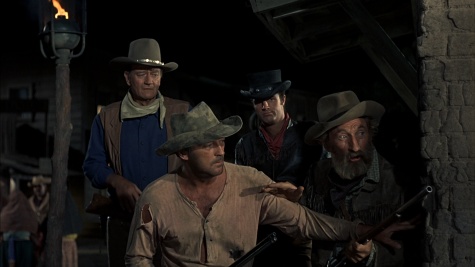 |
| [click on the thumbnail to enlarge] |
A funny thing happens once all that setup is out of the way. El Dorado from that point on settles into what might as well be a remake of one of screenwriter Leigh Brackett and director Howard Hawks' most colossally successful films, Rio Bravo. The lawman played by Robert Mitchum that we met early on...? He's the town drunk these days, the same as the former deputy that Dean Martin had played less than a decade earlier. Where Rio Bravo had a young upstart named Colorado fighting alongside the Duke, it's Mississippi (James Caan) this time around. Different state, different weapon of choice. Mississippi is lethal with a blade but couldn't hit the broad side of a barn with a revolver. John Wayne, naturally, plays John Wayne. Charlene Holt steps into Angie Dickinson's
Rio Bravo is as perfect a movie as they come. El Dorado -- the first of Hawks, Brackett, and Wayne's attempts to rekindle that spark -- isn't. That's not to say that this more-or-less remake isn't a hell of a good time in its own right. As brilliant as Rio Bravo's opening sequence is, showing the depths to which this drunken former deputy has fallen without a word of dialogue, El Dorado resonates in a different way. When we first meet Harrah, he's sober and very much a force to be reckoned with. His off-screen descent hits a lot harder when we've had a chance to see the heights from which he's fallen. Mitchum infuses
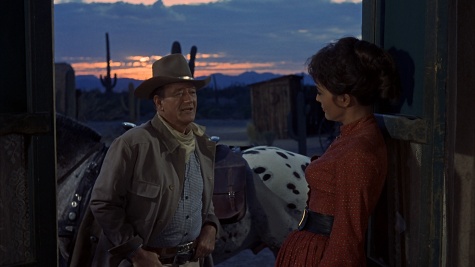 |
| [click on the thumbnail to enlarge] |
In one of the disc's audio commentaries, Peter Bogdanovich notes that a recurring theme throughout Hawks' work is that it's not if the goal is achieved; it's how the goal is sought. It's about professionals putting their skills to the test, and well-meaning amateurs need to get out of the way. There's a definite element of that in the premise of El Dorado, but it's there behind the scenes as well. The right talent is there on both sides of the camera. There's no denying the camaraderie between Thornton, Mississippi, and the recovering Harrah. The performances are strong across the board, especially those of marquee draws John Wayne and Robert Mitchum. The best of Leigh Brackett's dialogue is as witty and barbed as anything she penned for Rio Bravo. As relaxed as El Dorado is for so much of its runtime, the intense shootout at the church -- with Hunnicutt's aging oddball shooting at the bells and a bullet-riddled corpse tumbling straight towards the camera -- is proof-positive that Hawks can still deliver the goods. El Dorado slips on like a well-worn pair of shoes. The movie's less interested in plot or action than it is in just hanging out with these characters. Its very leisurely pace and at times cartoonish sense of humor keep it from matching the focused intensity of Rio Bravo at its best, and El Dorado doesn't take advantage of its supporting cast nearly as fully as its predecessor.
El Dorado isn't trying to make any grand artistic statement. It's a calculated attempt at mass appeal and a deliberate echo of a film that Hawks knew worked. At the end of the day, though, who cares? El Dorado doesn't approach the same heights as Rio Bravo, no, but it captures more than enough of what made the earlier film so wildly appealing: flawlessly cast, sharply written, familiar in all the right ways, and just a damned good time. Recommended.
Video
El Dorado probably would've looked reasonably impressive if Paramount had left well enough alone. There's essentially nothing in the way of wear or damage. The robust palette strikes me as comfortable and natural. Contrast is meaty enough to lend the image a nice sense of depth and dimensionality. The very high bitrate staves off any sputters or stutters in the AVC encode. There are certainly moments where I could look at the screen and tell that there used to be plenty of fine detail on display. The problem, disappointingly, is excessive filtering and processing. El Dorado is saddled with a chunky, waxy presentation, one that looks disappointing in screenshots and is even more frustratingly video-like in motion. El Dorado suffers far less than Paramount's clunkiest stabs at noise reduction, and on a smaller display or from across the room, it'll probably look fine to many eyes. The larger the setup, though, the more glaring the issues become. El Dorado just never looks comfortable in motion, and facial textures in particular can be jarring and offputting. If you'd like a case-in-point, open the screenshot below to full-size, and look at the lack of any texture in the clothing as well as how Robert Mitchum and James Caan's faces both look like something out of an oil painting:
The heavy-handed filtering in El Dorado isn't severe enough to entirely take me out of the movie as it has on even lesser Blu-ray releases, but it's a definite and wholly unnecessary disappointment just the same. Not at all a deal breaker, though, especially at the modest asking price of $11.49 on Amazon as I write this.
The high-bitrate AVC encode for El Dorado spans both layers of this BD-50 disc, and the mattes are opened up a bit to reveal an aspect ratio of 1.78:1.
Audio
The flipside of the case claims that there's a 5.1 remix, but purists have no need to wince. That's a typo, and El Dorado does indeed preserve the film's original monaural presentation. I'll admit to being a bit surprised to see
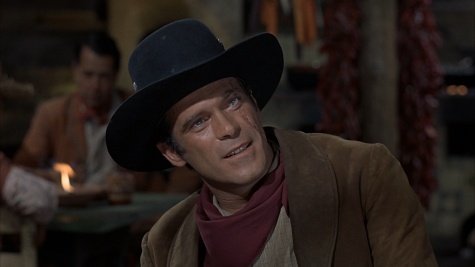 |
| [click on the thumbnail to enlarge] |
El Dorado also features lossy monaural dubs in French and Spanish, both presented in Dolby Digital 2.0 (224kbps). Subtitles are offered in English (SDH), French, and Spanish.
Extras
- Ride, Boldly, Ride: The Journey to El Dorado (42 min.; HD): The centerpiece of this special edition of El Dorado is its 7-part documentary. As engaging and comprehensive as its runtime suggests, "Ride, Boldly, Ride" delves into most every aspect of the film. This includes Howard Hawks generously lifting from one of his most staggering successes to rebound from a pair of expensive flops, the bleaker original screenplay by Leigh Brackett being extensively rewritten for more commercial appeal, and the considerable delay of its release stateside in the midst of Paramount's acquisition by Gulf/Western. Though the documentary lavishes a good bit of time on El Dorado's three leading men, the central focus of "Ride, Boldly, Ride" is placed squarely on Hawks: his storied career than spans every conceivable genre, his transition from the silent era through the studio system through the saragasso sea of corporate ownership, his personality, his understated style as a filmmaker, and even the recurring themes throughout his work. Well worth setting aside the time to watch.
- Audio Commentaries: El Dorado also features two commentary tracks: the first with filmmaker Peter Bogdanovich and the other with critic/film historian Richard Schickle (with occasional appearances by actor Ed Asner and biographer Todd McCarthy). The commentaries have different leanings, with Bogdanovich focusing more on the technical side of filmmaking as well as touching on his extensive time spent with Hawks, while Schickle's is more scholarly in nature. Bogdanovich's conversation would've been compelling on its own, but there's so much overlap with "Ride, Boldly, Ride" that it does feel a bit too much like more-of-the-same. The standout moments tend to be the more personal ones, such as Bogdanovich recalling Hawks' snarky reaction to the slo-mo carnage in The Wild Bunch. The conversation with Schickle better complements the disc's documentary. He delves more into "The Stars in Their Courses", the novel on which El Dorado is loosely based, as well as the widespread appreciation of Hawks among European cineastes, how Hawks' age likely influenced the relaxed pace of the film, and even the approach to lighting Westerns throughout the '50s and '60s. Schickle is willing to criticize El Dorado when deserved, especially the ways in which it falls short of Rio Bravo. McCarthy and Asner don't appear nearly as often, but their comments are appreciated, and it's especially wonderful hearing from someone who was in the trenches as Asner was. Though I enjoyed both commentaries, Schickle's is easily the most essential of the two.
- Behind the Gates: A.C. Lyles Remembers John Wayne (5 min.; HD): The since-departed A.C. Lyles -- a producer with one of
the lengthiest careers in film history -- speaks briefly about John Wayne's work at Paramount. Lyles is a charmer with plenty of stories to tell about the Duke, and his comments are punctuated by a number of high-resolution production stills as well excerpts from Wayne's films.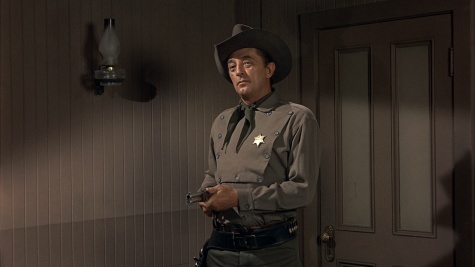
[click on the thumbnail to enlarge] - The Artist and the American West (5 min.; SD): This vintage featurette aims the spotlight at Olaf Wieghorst, the painter whose artwork is showcased throughout the opening titles of El Dorado and who appears in the flesh in a small but memorable role. "The Artist and the American West" is part bio and part promotional piece, and there's even some staged palling around between Wieghorst and both John Wayne and Howard Hawks.
- Trailer (3 min.; SD): A theatrical trailer rounds out the extras.
The Final Word
No matter how many similarities the two movies may share, El Dorado isn't a stone cold classic in the same league as Rio Bravo. That doesn't stop me from greatly enjoying Howard Hawks' approach to the same general material a second time. It's a relaxed hangout of a movie with a tried-and-true premise, a screenplay overflowing with razor-sharp dialogue, and a couple of Hollywood's most iconic actors doing what they do best. The heavily filtered presentation is a disappointment, but the selection of quality extras and modest sticker price ease that sting well enough. Recommended.
|
| Popular Reviews |
| Sponsored Links |
|
|
| Sponsored Links |
|
|
| Release List | Reviews | Shop | Newsletter | Forum | DVD Giveaways | Blu-Ray | Advertise |
|
Copyright 2024 DVDTalk.com All Rights Reserved. Legal Info, Privacy Policy, Terms of Use,
Manage Preferences,
Your Privacy Choices | |||||||









